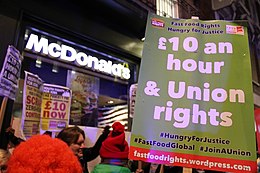
Back عبودية الأجر Arabic Esclavitud del salari Catalan Námezdní otroctví Czech Кĕрĕшев чуралăхĕ CV Lohnsklaverei German Μισθωτή δουλεία Greek Salajrosklaveco Esperanto Esclavitud del salario Spanish بردهداری مزدی Persian Palkkaorjuus Finnish
| Part of a series on |
| Capitalism |
|---|

Wage slavery is a term used to criticize exploitation of labour by business, by keeping wages low or stagnant in order to maximize profits. The situation of wage slavery can be loosely defined as a person's dependence on wages (or a salary) for their livelihood, especially when wages are low, treatment and conditions are poor, and there are few chances of upward mobility.[1][2]
The term is often used by critics of wage-based employment to criticize the exploitation of labor and social stratification, with the former seen primarily as unequal bargaining power between labor and capital, particularly when workers are paid comparatively low wages, such as in sweatshops,[3] and the latter is described as a lack of workers' self-management, fulfilling job choices and leisure in an economy.[4][5][6] The criticism of social stratification covers a wider range of employment choices bound by the pressures of a hierarchical society to perform otherwise unfulfilling work that deprives humans of their "species character"[7] not only under threat of extreme poverty and starvation, but also of social stigma and status diminution.[8][9][4] Historically, many socialist organisations and activists have espoused workers' self-management or worker cooperatives as possible alternatives to wage labor.[5][10]
Similarities between wage labor and slavery were noted as early as Cicero in Ancient Rome, such as in De Officiis.[11] With the advent of the Industrial Revolution, thinkers such as Pierre-Joseph Proudhon and Karl Marx elaborated the comparison between wage labor and slavery, and engaged in critique of work[12][13] while Luddites emphasized the dehumanization brought about by machines. The introduction of wage labor in 18th-century Britain was met with resistance, giving rise to the principles of syndicalism and anarchism.[14][15][10][16]
Before the American Civil War, Southern defenders of keeping African Americans in slavery invoked the concept of wage slavery to favourably compare the condition of their slaves to workers in the North.[17][18] The United States abolished most forms of slavery after the Civil War, but labor union activists found the metaphor useful – according to historian Lawrence Glickman, in the 1870s through the 1890s "[r]eferences abounded in the labor press, and it is hard to find a speech by a labor leader without the phrase".[19]
- ^ "wage slave". merriam-webster.com. Retrieved March 4, 2013.
- ^ "wage slave". dictionary.com. Retrieved March 4, 2013.
- ^ Sandel 1996, p. 184.
- ^ a b "Conversation with Noam Chomsky". Globetrotter.berkeley.edu. p. 2. Retrieved June 28, 2010.
- ^ a b Hallgrimsdottir & Benoit 2007.
- ^ "The Bolsheviks and Workers Control, 1917–1921: The State and Counter-revolution". Spunk Library. Retrieved March 4, 2013.
- ^ Avineri 1968, p. 142.
- ^ Fitzhugh 1857.
- ^ George 1981, "Chapter 15".
- ^ a b Ostergaard 1997, p. 133.
- ^ Cicero, Marcus Tullius (January 1, 1913) [First written in October–November 44 BC]. "Liber I" [Book I]. In Henderson, Jeffrey (ed.). De Officiis [On Duties]. Loeb Classical Library [LCL030] (in Latin and English). Vol. XXI. Translated by Miller, Walter (Digital ed.). Cambridge, MA: Harvard University Press. pp. 152–153 (XLII). doi:10.4159/DLCL.marcus_tullius_cicero-de_officiis.1913. ISBN 978-0-674-99033-3. OCLC 902696620. OL 7693830M. Archived from the original on April 6, 2018.
XLII. Now in regard to trades and other means of livelihood, which ones are to be considered becoming to a gentleman and which ones are vulgar, we have been taught, in general, as follows. First, those means of livelihood are rejected as undesirable which incur people's ill-will, as those of tax-gatherers and usurers. Unbecoming to a gentleman, too, and vulgar are the means of livelihood of all hired workmen whom we pay for mere manual labour, not for artistic skill; for in their case the very wage they receive is a pledge of their slavery. Vulgar we must consider those also who buy from wholesale merchants to retail immediately; for they would get no profits without a great deal of downright lying; and verily, there is no action that is meaner than misrepresentation. And all mechanics are engaged in vulgar trades; for no workshop can have anything liberal about it. Least respectable of all are those trades which cater for sensual pleasures[.]
- ^ Proudhon 1890.
- ^ Marx 1969, Chapter VII.
- ^ Thompson 1966, p. 599.
- ^ Thompson 1966, p. 912.
- ^ Lazonick 1990, p. 37.
- ^ Foner 1995, p. xix.
- ^ Jensen 2002.
- ^ Lawrence B. Glickman (1999). A Living Wage: American Workers and the Making of Consumer Society. Cornell U.P. p. 19. ISBN 978-0-8014-8614-2.